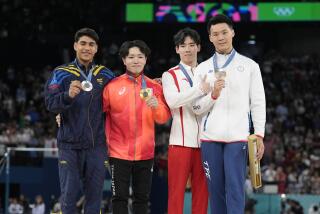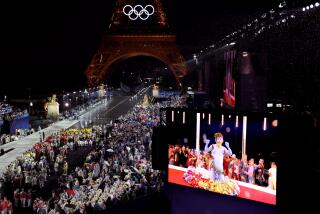Seoul Opens Its Heart and Its Heavens, Too, as Asian Games Begin
- Share via
SEOUL, South Korea — When the forecast called for rain during the Goodwill Games opening ceremony earlier this summer in Moscow, the Soviet government had the clouds seeded. The result was a premature afternoon thunderstorm, which was halfway to Kiev before the ceremony began that cloudless evening in Lenin Stadium.
The following morning, the clouds returned. For the next nine days, it rained. The moral: It’s not nice to fool with Mother Nature.
She was in a mischievous mood again Saturday, but the South Koreans, who have either more wisdom or less technology to deal with these matters, let it rain on their most important parade since the Korean War ended more than three decades ago.
The occasion was the opening ceremony of the 10th Asian Games at the 75,000-seat Olympic Stadium, where the Summer Olympics will begin Sept. 17, 1988.
Almost 5,000 athletes from 27 countries are attending the 16-day sports festival, the Asian equivalent of the Pan American Games. Members of the Seoul Olympic Organizing Committee (SLOOC) call the Asian Games a dress rehearsal for the Olympics. If Saturday is an indication, dress in a raincoat.
It was because SLOOC members wanted to avoid the rain that they recommended the Olympics begin in late September instead of the monsoon season of July and August.
Still, officials here saved face by putting forward a smiling one. As Lee Jae Hong, the SLOOC’s director of public relations, joked, “Perhaps the North Koreans were shooting the clouds to make it rain.”
He didn’t have to add that he hopes that is the North Koreans’ only target during the next two weeks. South Korean and U.S. military officials have warned about potential disruptions of the Asian Games by the North Koreans, who are jealous of the worldwide attention their rivals to the south are receiving. The North Koreans refuse to be a party to it, boycotting the Asian Games.
South Korean officials accused the North Koreans of being a party to something less sporting last Sunday, a terrorist bombing at Seoul’s Kimpo International Airport that killed five and injured more than 30. The North Koreans have denied involvement.
Security measures since have been tightened, not that they were relaxed before. Security is at least as intense as it is for international sporting events in Moscow, the only noticeable differences being that the uniformed guards here say, “Thank you,” after frisking you and that the metal detectors at all venues are painted a cheery yellow and say, “Welcome to Korea.”
South Korean President Chun Doo Hwan, Japanese Prime Minister Yasuhiro Nakasone and Saudi Arabian Crown Prince Faisal Fahd Abdul Aziz were among a capacity crowd that watched as the opening ceremony proceeded without incident. That doesn’t mean it was orderly, at least not in the true sense of the word. According to the Korean alphabet, Iran was supposed to follow immediately behind Iraq in the march of nations into the stadium.
But since those two countries have been at war for several years, the Iraqis didn’t want their backs turned in such close proximity to the Iranians. They compromised, the Iraqis marching before the Iranians but with the Jordanians between them. A lot of Jordanians.
Before they would march, the Islamic Iranians also had to be appeased on a religious matter, demanding a male standard bearer for fear that a woman might defile their delegation. The South Koreans, who are new to this, thought they had heard it all until then.
The South Koreans have the most athletes here, 657, followed by the Japanese with 591 and the Chinese with 514. Outside of the South Koreans, the Chinese received the loudest ovation Saturday. Until early this year, there was no guarantee that the Chinese would be here because their government, which supported North Korea during the Korean War, does not have diplomatic relations with South Korea.
Eight members of the Olympic Council of Asia besides North Korea did not send teams--Burma and Syria for financial reasons, Brunei because of the recent death of the sultan’s father, and Vietnam, Mongolia, Laos, Afghanistan and South Yemen because of political differences with South Korea.
All of them combined are not as important to the South Koreans as the Chinese, whose participation here indicates that they will also attend the Olympics.
The South Koreans are not as confident about the Soviet Bloc countries, who also do not have diplomatic relations with the government here.
SLOOC officials, however, were encouraged by the attendance at the opening ceremony Saturday of two Soviet sports officials and one each from Hungary and Romania. International Olympic Committee officials said last week that Soviet Sports Minister Marat Gramov would attend, but SLOOC officials said he was not here and that they never expected him.
There is no doubt about the significance of these games and the 1988 Olympic Games to South Korea, which won the right to host the 1970 Asian Games but had to withdraw for financial reasons. Now that South Korea is on the verge of becoming an advanced nation, the people here want the rest of the world to know it. And applaud.
For their coming-out party, the South Koreans have constructed some of the most striking sports facilities in the world, challenged an air pollution problem that rivals the one in Los Angeles, built an extensive subway system, beautified the Han River that not so long ago was an industrial dump, given their service employees etiquette lessons, taught cabbies to drive courteously, if not always on the right side of the road, and begun a campaign against the habit some Koreans have of spitting in public.
Which is all fine. But who’ll stop the rain?
More to Read
Go beyond the scoreboard
Get the latest on L.A.'s teams in the daily Sports Report newsletter.
You may occasionally receive promotional content from the Los Angeles Times.






